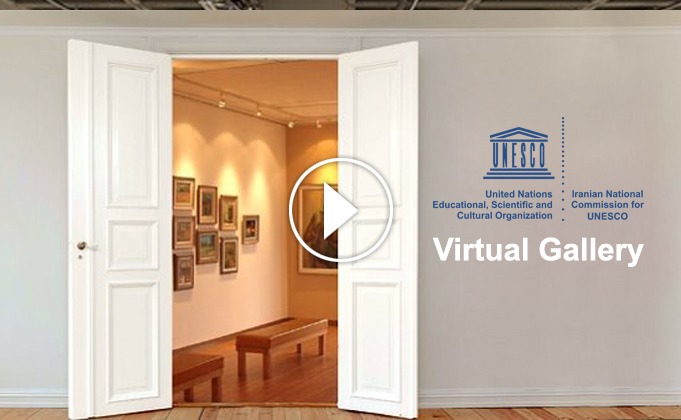1-Organizing National Introductory Workshop on Inclusive Education for Children with Special Needs.
(Tehran/ 27-29 August 2018)
Organizers: Iranian National Commission for UNESCO, UNESCO Tehran Cluster Office, UNICEF Country Office in Iran, and the Iranian Ministry of Education.
Sponsor
UNICEF Country Office in Iran.
Main Objective
The main objective of this workshop was to build the capacity of the Iranian primary school teachers and teaching support staff in detecting the early signs of developmental disorders and concerns, to ensure that teachers are trained and up skilled in selecting educational interventions that are evidence-based and fit with individual students’ needs.
Participants
40 participants (15 male and 25 women) attended the workshop. The participants were regular school teachers, special school teachers, resource teachers who support regular school teachers, school administrators, and Ministry of Education advisors. Almost half of the participants were working in regular schools and half were from the special education organization. The participants represented 20 different provinces across Iran and there were at least one person from regular schools and one from the special education organization from each of the provinces.
Methodology
The workshop included different sessions delivered by Dr Matias Irarrazaval from the World Health Organization and Mrs. Dr. Chris Forlin, International education consultant specializing in inclusive education, and included varieties of activities: group work, roundtables, presentations and discussions. The activities enabled participants to learn new concepts, use them in small groups and then discuss them in open sessions. This led to a participatory atmosphere.
– On the first day of the workshop, participants became acquainted with the
inclusive education concepts and resource materials for supporting inclusive
practice.
- On the second day, participants were given the opportunity to attend sessions based on specific themes within inclusive education, the creation of inclusive educational environments and the curriculum adaptation and implementing for inclusive classroom interventions.
- On The final day of the workshop, participants got familiar with the role of special schools, teacher education and parents in the collaborative practices of the inclusive education.
Outcomes of the workshop:
Increased capacity among participants, including the following competencies:
- Identifying the symptoms and impacts of developmental disorders in children with disabilities;
- Recognizing and managing common presentations of developmental disorders considered under the objectives;
- Understanding general principles of inclusion in schools.
- Teachers trained in the identification and management of developmental disorders and concerns and familiarized with the most up-to-date material on mental health issues and educational support in schools.
- An operational Iranian roster of teachers that can train other teachers on the identification and management of developmental disorders and concerns.
A description of opening ceremony speeches
At the opening ceremony, Dr. Hojatollah Ayoubi, Secretary-General of the Iranian National Commission for UNESCO, Dr. Gholamreza Karimi, Head of the Centre for International Affairs and Schools Abroad of the Ministry of Education, Dr. Maryam Soltanzadeh, UNESCO Programme Officer for Education; Dr. Will Parks, UNICEF Representative to Iran; and Dr. Majid Ghadami, Head of the Special Education Organization; delivered speeches.
Dr Ayoubi was the first speaker. He highlighted the importance of showcasing the experiences of Iran on inclusive education to the international community and said: “The Islamic Republic of Iran has great experiences in making science of inclusive specially for children with special needs, and we hope that this workshop can provide an opportunity for the exchange of knowledge and practices, because the exchange of knowledge and innovations globally is a better contributor to development than wealth.”
Dr Gholamreza Karimi, emphasized the importance of international experiences and best practices on inclusive education, and said: “To foster the exchange of experience specially on the education of students with special needs, we need to cooperate with international organizations, regional offices in Tehran such as UNESCO, ISISCO, UNICEF and other UN bodies.”
Dr. Maryam Soltanzadeh, pointed out that inclusive education is one of the key principles of national Fundamental Reform Document of Education and that education systems must be inclusive and respond flexibly to the circumstances and needs of all learners. Hence, there is a need to work with individual teachers, who are the real actors of inclusive practices, in order to effectively respond to the circumstances and needs of all learners”.
Dr. Will Parks, highlighted the fact that inclusive education is established as a key priority in the Islamic Republic of Iran’s Fundamental Reform Document of Education.
Dr. Majid Ghadami said: “Our approach to inclusive education is that disability is not an individual problem, it’s a community’s problem and schools should accommodate all children regardless of their physical, intellectual or other conditions, so we have to form a flexible educational system to respond effectively to the needs of different students”.
The workshop will be followed up by organizing some meetings and workshops in the future.
Full report of the workshop is accessible through below link:
The news of the workshop has been posted on the below websites:
http://news.armanin.ir/fa/content/11817369.html
2- Organizing Educational planning for crisis risk reduction workshop
Teheran, November 26-29, 2018
Organizers
Iranian National Commission for UNESCO, UNESCO Tehran Cluster Office, UNESCO International Institute for Educational Planning (IIEP), UNICEF Country Office in Iran, and the Iranian Ministry of Education.
Sponsor
UNICEF Country Office in Iran.
Partners
Natural Disaster Research Institute, Red Crescent Organization and the other relevant institutions.
Objectives
The main objective of the training workshop was to build the capacity of the participants to analyze the impact of crises, including natural disasters, on education, and to identify how to integrate crisis risk reduction into national education sector planning processes.
Participants
25 participants (9 male and 16 female) included officials from the provincial government in charge of disaster response and officials from the Provincial ministry of Education with decision making powers.
Methodology
The workshop included seven sessions delivered by IIEP programme specialists on educational planning for disaster risk reduction (DRR) (Morten Sigsgaard and Thalia Seguin). During these sessions, attendees had active participation in the discussions and most of the problems regarding the continuation of education in disaster situation were discussed.
Outcomes of the workshop
- Analyzing risks of natural hazards that impact the country’s education sector, and identifying capacities that are already in place to respond to and prevent the impact of crisis;
- Identifying opportunities for coordination between humanitarian and development activities in the country;
- Examination of existing and proposed policies in the country, in order to respond to risks that could affect the education system;
- Identifying programmes and building stakeholder support;
- Generating a cost estimation, using scenarios to assess the feasibility of policies, and to identify sourcesoffinancing;
- Developing measurable and realistic indicators and identifying the sources of information necessary for monitoring and evaluation.
A description of opening ceremony speeches
At the opening ceremony, Dr. Hojatollah Ayoubi, Secretary-General of the Iranian National Commission for UNESCO, Dr. Maryam Soltanzadeh, head of the Education sector of UNESCO office in Tehran, Mr. Will Parks, head of the UNICEF office in Tehran, Dr Mehrzad Hamidi, Deputy Minister for Health and Physical Activities at the Ministry of Education, delivered speeches.
Dr. Hojatollah Ayoubi said: “The first principle we need to consider in responding to natural disasters is the manner of treating nature and earth. Our country is always vulnerable to natural hazards because of its geographical location; hence experts and governmental officials should make the necessary arrangements for responding to disaster situations”.
Dr. Maryam Soltanzadeh said: “Disaster resilience is one of the main objectives of Fundamental Reform Document of Education and the strategies this Document provides for fostering disaster resilience, especially in rural and deprived areas, are accepted at national level”.
Mr. Will Parks said: “About 264 million children cannot attend school and this problem is affected by the climatic conditions and the various natural disasters. We must provide the necessary conditions for the education of all children to provide them with a better future.”
Dr Mehrzad Hamidi pointed out that disaster resilience is one of the tasks implemented according to the Ministry of Education’s strategy and explained about the measures have been undertaken by the Organization for Development, Renovation and Equipping Schools.
Full report of the workshop is accessible through:
The news of the workshop has been posted on the below websites:
http://www.pana.ir/news/874882
3- Ceremony of Lunching the Exhibition of Afghan Artists, entitled: Lapis Lazuli Pens
Tehran/ On 21 December 2018
Organizers
The Iranian National Commission for UNESCO
Sponsor
National Library and Archives of the Islamic Republic of Iran, and Children Research Institute .
Objective
Displaying the strong bond between the Afghan and the Iranian nations through art, especially calligraphy and painting and supporting Afghan artist migrants to Iran.
Participants
About 400 Afghan and Iranian people, Artists, Ambassadors and Iranian and Afghan officials.
Duration
Exhibition started from 21 and ran to 26 December 2018.
Methodology
Delivering speeches on the importance of cultural relations, organizing educational workshops on art (calligraphy and painting), putting on display the works of art of Afghan nation specially women and children artists in exhibition.
Outcome of the Exhibition:
– Strengthening the relation between Iran and Afghan artists,
- Putting on display the artistic feature of Afghan people,
- Supporting social and cultural activities of the migrants, specially Afghan nation, in Iran.
A description of opening ceremony speeches
The Opening was attended by HE, the Ambassador of the IR of Afghanistan to Iran, the Ambassador and Permanent Delegate of the IR of Iran to UNESCO, the Secretary General of the Iranian National Commission for UNESCO, the Vice President and Director of the National Library and Archives of the IR of Iran, Cultural Attaché of Afghanistan to Iran and Cultural Attaché of Iran to Afghanistan, Cultural Attaché of Turkey to Iran, Head of the Iran-Tajikistan Friendship Organization and others.
Dr Boroujerdi, Vice President and Director of the National Library and Archives of the IR of Iran was the first speaker. She referred to holy scriptures and the script of the Holy Quran that emphasizes the importance of the pen, when it swears at the Pen, thus showing the importance of writing, painting, etc.
The second speaker was Dr Nasir Ahmad Nour, Ambassador of the Islamic Republic of Afghanistan to the IR of Iran. He briefed the session on the achievements of the Afghan youth all around the world.
The floor was then given to Dr Ahmad Jalali, Ambassador and Permanent Delegate of the IR of Iran to UNESCO. He referred to the very good cooperation between Afghanistan and Iran especially in the field of Intangible Cultural Heritage.
Dr Ayoubi, Secretary General of the Iranian National Commission for UNESCO expressed his gratitude to all organizers and participants. Quoting from Shams of Tabriz, he said “some activities come from the heart and not from the head”, explaining that this heartfelt event is organized purposefully on the occasion of the International Migrants Day, which coincides with the Iranian tradition of Yalda, to reveal our friendship with our migrant Afghans. He then wished the very best for all Afghans.
Report of the exhibition is accessible through below link:
http://en.irunesco.org/?s=exabition
The news of the exhibition has been posted on the below Iranian and Afghan websites:
https://mehnews.com/photo/4 نمایشگاه – قلم-های- لاجورد/491774
http://farhang-press.com/index/قلم%E2%80%8Cهای-لاجورد-مهاجرین-افغانستان-د-2/
https://www.isna.ir/news/97100100488/ملتی-که-دست-در-رنگ-دارد-نمی-تواند-دست-در-جنگ-داشته-باشد
Prepared by: Peymaneh Pourhadi


